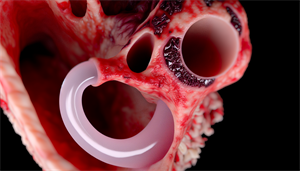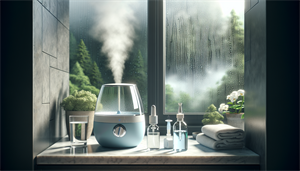When your nose starts making a squeaky noise, you’re likely dealing with narrowed air passages. Congestion, allergies, or structural conditions like a deviated septum can be at blame.
This article demystifies “why is my nose making a squeaky noise” and when it might be more than just an amusing noise. Dive in to understand the reasons behind your nasal acoustics and learn when you should consider seeing a doctor.
Key Takeaways
-
Nasal squeaking is caused by airflow encountering obstructions or irregularities in the nasal passages, which can occur due to factors like mucus buildup or structural issues such as a deviated septum or septal perforation.
-
Persistent nasal noises may be indicative of underlying conditions, including allergies, structural concerns like a deviated septum, or sinus infections, and should be evaluated by a healthcare professional if symptoms are severe or continue beyond 10 days.
-
While non-invasive remedies like hydration, humidification, and saline solutions can provide temporary relief, long-term solutions like surgery or innovative procedures such as Vivaer Nasal Airway Remodeling may be necessary for persistent nasal noises.
Decoding the Squeaky Sounds from Your Nose

The symphony of sounds our bodies produce is truly fascinating, from the rhythmic beating of our hearts to the soft whisper of air passing through our lungs. But what about the squeaking sounds that occasionally emanate from our noses? What could possibly be behind this intriguing auditory phenomenon?
The answer lies in the mechanics of our nasal passages and the key role they play in our respiratory system. The nasal cavity, with its intricate network of bones, tissues, and blood vessels, not only filters and warms the air we breathe but also serves as the stage for these peculiar sounds. Obstructions or structural issues can turn this stage into a concert hall for nasal noises, producing the phenomenon we often refer to as a nose whistle.
The Mechanics of Noisy Breathing
Consider the mechanics of noisy breathing akin to a gust of wind sweeping through a narrow alleyway. This wind, interacting with the surrounding architecture, causes a whistling sound. In the same manner, air pressure flowing through your nasal passages can emit a squeaking sound upon encountering obstructions or irregularities.
These obstructions could be a result of mucus buildup, a common consequence of a cold or allergy, or due to a structural issue, such as a hole in the nasal septum, also known as a septal perforation. This perforation could occur due to an injury or following a rhinoplasty, a surgical procedure performed to reshape the nose. The inadvertent removal of excess cartilage or internal nasal lining during the procedure can create a hole in the septum, leading to the infamous nose whistle.
Unraveling the Role of the Nasal Cavity

Nature’s design marvel, the nasal cavity, plays a significant role in our respiratory system by humidifying and warming the air we inhale for our lungs’ comfort. However, obstructions or structural problems can cause air trapped in the nasal cavity, leading to the production of nose whistles.
The nasal cavity is composed of:
-
Bones
-
Tissues
-
Blood vessels
-
Nerves
Collectively, these define the space inside our nose. It’s a meticulously designed system, where even the slightest alteration or obstruction can disrupt the smooth flow of air, leading to the creation of various sounds, including the squeaking sound we are dissecting.
Pinpointing the Causes Behind Nasal Squeaks
With a basic understanding of the nose whistle’s mechanics, let’s delve deeper to identify the root causes of these peculiar sounds. Several factors, including allergies leading to nasal congestion and structural issues like a deviated septum, can contribute to nasal squeaks.
Allergies are notorious for triggering nasal congestion, a common symptom of allergic rhinitis, which can lead to nasal squeaks. Similarly, structural issues like a deviated septum can also contribute to a squeaky nose by obstructing airflow and causing turbulent airflow, which subsequently creates the squeak.
Allergies: The Trigger for Noisy Nasal Passages

Did you know that your seasonal allergies could be the concertmaster behind your nasal symphony? Allergies can lead to inflammatory responses in your nasal passages, causing them to swell up, resulting in a congested, stuffy nose. This inflammation can cause turbulent airflow when you breathe, leading to a squeaky nose.
Common allergens such as pollen, dust mites, and pet dander can trigger these reactions. The ensuing allergic rhinitis can cause an array of symptoms, including:
-
nasal squeaking
-
sneezing
-
itching
-
watery eyes
-
congestion or a runny nose
So, next time your nose starts to sound like a squeaky toy, your allergies might be the culprit.
Structural Concerns: Deviated Septum and Other Anomalies
Aside from allergies, structural issues in your nasal passages can also lead to a squeaky nose. A deviated septum, for example, can obstruct airflow, causing turbulent airflow, which subsequently creates the squeak.
Along with a deviated septum, nasal polyps - benign growths that occur within the nasal passages or sinuses - can also impede the flow of air, leading to the emission of squeaky sounds during respiration. Other growths in the nasal passage, benign or cancerous, can also lead to the production of whistling sounds, akin to nasal squeaks.
The Impact of Sinus Infections on Nasal Sounds
Sinus infections, also known as sinusitis, refer to the inflammation of the sinuses, characterized by facial pain, a congested or runny nose with viscous mucus, and swelling of the sinuses. These infections can exacerbate nasal squeaking sounds by inducing congestion and mucus buildup in the nasal passages.
Elevated mucus production resulting from sinus infections can cause nasal congestion and a modification in the characteristics of nasal sounds. Inflammation in the sinuses can result in nasal squeaking. Sinus congestion can produce crackling sounds, while nasal inflammation or sinusitis may lead to whistling or squeaking noises in the nose.
When to Seek Medical Attention for a Squeaky Nose

While a squeaky nose might seem like a curious anomaly, it’s important to take note when these sounds persist or if symptoms persist, such as difficulty breathing or nasal congestion. It is recommended to seek medical attention if nasal noises persist for more than 10 days or are accompanied by other concerning signs such as:
-
Difficulty breathing
-
Nasal congestion
-
Frequent nosebleeds
-
Facial pain or pressure
-
Fever
-
Headache
Leaving nasal noises untreated can result in complications such as:
-
Chronic sinusitis
-
Paranasal sinus mucocele
-
Vision problems
-
Infections
-
Preseptal cellulitis
-
Orbital cellulitis
-
Subperiosteal abscess
-
Orbital abscess
-
Meningitis
-
Brain abscess
-
Infection of the bone
Therefore, it’s crucial to seek medical attention when necessary to mitigate potential complications and enhance overall nasal health.
Recognizing Signs That Go Beyond a Simple Squeak
Beyond the simple squeak, there are several signs that indicate a need for medical attention. Some of these signs include:
-
Persistent nasal congestion
-
Enduringly stuffy nose
-
Nasal drainage
-
Reduced sense of smell
-
Facial pressure
-
Swelling or infection in the sinuses
If you experience any of these symptoms, it is important to seek medical attention as they may indicate more serious nasal conditions.
In addition to these symptoms, indicators of severe sinus infection may encompass:
-
Nasal congestion
-
Drainage
-
Facial pain/pressure
-
Decreased sense of smell
-
Pain, swelling or redness around the eyes
-
High fever
-
Confusion
-
Double vision or other vision changes
-
Stiff neck
-
Blocked or stuffy nose
-
Pain and swelling around the eyes and cheeks
-
Post-nasal drip
-
Headache
-
Sore throat
-
Cough
-
Bad breath
-
Fever
-
Weakness
-
Fatigue
Understanding these signs that go beyond a simple squeak can help you seek timely medical attention and prevent potential complications.
The Risks of Leaving Nasal Noises Untreated
While it may be tempting to ignore the squeaky symphony of your nose, especially if it causes no immediate discomfort, untreated nasal noises can lead to severe complications. Failing to address nasal noises can lead to:
-
Chronic inflammation
-
Sinus infections
-
Reduced quality of life
-
Vision problems
-
Infections
-
Brain abscess
It is important to seek medical attention if you are experiencing persistent nasal noises.
The potential long-term consequences of chronic nasal inflammation, such as chronic sinusitis, include:
-
inflamed and swollen sinuses
-
facial pain
-
post-nasal drip
-
thick yellow or green mucus
-
potential loss of smell
In addition, untreated nasal congestion can have serious implications for sinus health, potentially leading to difficult living conditions and even life-threatening infections.
Non-Invasive Remedies for Immediate Relief

Having explored the causes and potential risks linked to nasal noises, our focus now shifts towards non-invasive remedies for immediate relief. These remedies can provide temporary relief from nasal noises and can be a good starting point before seeking professional medical help.
Proper hydration and humidification can help alleviate nasal squeaks by:
-
Maintaining thin and moist mucus
-
Enhancing the effectiveness of cilia in eliminating debris, bacteria, and viruses
-
Increasing fluid intake aids in mucus thinning and facilitates sinus drainage
-
Humidification aids in alleviating nasal noises by facilitating the loosening of mucus, thus making it easier to expel through coughing and unclogging a congested nose.
Hydration and Humidification: A First Line of Defense
Maintaining proper hydration can assist in keeping the mucous membranes moist, which is crucial for ensuring that the mucus in the nose remains thin and conducive for the cilia to efficiently expel debris, bacteria, and viruses. This can result in a decrease in nasal congestion.
Elevating the humidity in the air can effectively hydrate the nasal passages, thereby relieving dryness, a common cause of nasal discomfort. Both cool mist humidifiers and warm mist humidifiers can be efficacious in addressing nasal dryness, aiding in the maintenance of a more pleasant and tranquil nasal environment. The recommended humidity level for preserving healthy nasal passages and minimizing discomfort is typically between 30% to 50%.
Saline Solutions and Nasal Sprays: Clearing the Airways
Saline solutions function to alleviate nasal or sinus dryness, congestion, allergies, or snoring by moisturizing the nasal cavity, while sinus rinse aids in clearing congestion. Nasal sprays assist by reducing swelling in the blood vessels and tissues in the nose, and delivering medication in a fine mist.
Over-the-counter steroid and antihistamine nasal sprays such as Flonase, Nasacort, and Astepro are strongly recommended for nasal congestion. A homemade saline solution can be made by combining salt, baking soda, and water. However, it’s important to be aware of potential side effects that may arise from the use of saline solutions and nasal sprays, such as allergic reactions and a runny nose, particularly if used excessively.
Nasal Strips
If your nose is making sounds, causing snoring, you should consider using nasal strips. By using these adhesive devices, you can open up your nasal airway, reducing squeaky snoring sounds.
Advanced Treatments for Persistent Nasal Noises
Although non-invasive remedies offer effective immediate relief, they may not provide a long-term solution for persistent nasal noises. In these instances, one can consider advanced treatments, including surgical options and innovative procedures for airway improvement.
Surgical procedures available for the treatment of persistent nasal noises include:
-
Endoscopic sinus surgery
-
Functional endoscopic sinus surgery (FESS)
-
Balloon sinuplasty
-
Caldwell Luc surgery
However, the degree of effectiveness in treating soft tissue issues can differ based on the specific circumstances of each case. Therefore, it’s essential to consult with a healthcare professional before opting for any surgical procedure.
Exploring Surgical Options for Long-Term Solutions
In some cases, surgical intervention might be the most effective solution for persistent nasal noises. Septoplasty, a surgical procedure designed to correct a deviated septum, is one such option. This procedure involves the separation of the nasal mucosa from the septum, and the straightening or trimming of the cartilage and bone. The success rate of septoplasty varies between 43-90%, with the majority of sources indicating success rates of 85% or more.
However, surgery is not without its risks and downtime. Following septoplasty, a nasal splint may be inserted to aid in the healing process, and patients will receive detailed at-home care guidelines. It may be advised to refrain from blowing the nose for a few days, and if sneezing occurs, it is recommended to do so with the mouth open. Other surgical options like endoscopic septoplasty provide a minimally invasive alternative to the conventional surgical approach.
Innovative Procedures for Airway Improvement
In recent years, innovative procedures for airway improvement have been developed, providing non-invasive solutions for those struggling with nasal airway obstruction. One such innovative procedure is Vivaer Nasal Airway Remodeling. This non-surgical procedure is conducted in an office setting and offers the following benefits:
-
Utilizes temperature-controlled technology to enhance nasal airway obstruction
-
Does not require any incisions
-
Associated with minimal discomfort following the treatment
Vivaer Nasal Airway Remodeling is appropriate for individuals experiencing nasal airway obstruction, seeking long-term relief, and preferring a non-invasive treatment approach. Patients can anticipate experiencing discomfort for 1-2 days after the procedure and crusting at the treatment sites for up to 45 days during the recovery period. It is important to note that complications are uncommon.
Prevention Strategies to Keep Your Nose Quiet
As the adage goes, prevention is better than cure, and this is true for nasal health as well. With lifestyle adjustments and regular nasal hygiene practices, we can prevent nasal squeaks effectively and maintain a quiet nose.
Lifestyle adjustments such as avoiding allergens and ensuring proper hydration can help in providing long-term relief for a squeaky nose by minimizing the likelihood of allergic reactions and the resulting inflammation.
Here are some tips to help with a squeaky nose:
-
Avoid allergens that trigger your symptoms
-
Drink plenty of water to stay hydrated
-
Use a saline nasal spray to keep your nasal passages moisturized
-
Practice regular nasal hygiene by gently blowing your nose and using a nasal rinse or neti pot to flush out irritants
-
Use a humidifier to add moisture to the air in your home
By following these tips, you can reduce the occurrence of squeaky noises often attributed to dry or congested nostrils.
Regular Nasal Hygiene Practices
Regular nasal hygiene practices can provide a significant boost to your nasal health and reduce the chances of developing a squeaky nose. These practices include:
-
Using a saline spray or nasal rinsing to maintain moisture in the nasal passages
-
Utilizing a humidifier in dry environments
-
Avoiding irritants such as smoke and allergens
Nasal hygiene practices, such as nasal irrigation, can be performed on a daily basis or several times a week, based on individual needs. It is advisable to begin with one irrigation per day and adjust the frequency as needed to mitigate sinus infections or allergy symptoms.
It’s also advisable to refrain from nose picking, as it can lead to nasal congestion, a condition often associated with squeaky nasal sounds.
Lifestyle Adjustments to Avoid Allergic Reactions
Lifestyle modifications can be instrumental in averting nasal squeaks. By adopting certain dietary changes and avoiding allergens, you can reduce your risk of allergic reactions, a common cause of nasal squeaks.
Consuming foods high in vitamins, especially vitamin C, can enhance your immune system and lower the likelihood of allergic reactions. Some foods high in vitamin C include:
-
Citrus fruits (oranges, lemons, grapefruits)
-
Berries (strawberries, blueberries, raspberries)
-
Kiwi
-
Bell peppers
-
Broccoli
-
Spinach
Avoiding common allergens like pollen, dust, dander, mold spores, and specific food allergens such as milk, eggs, peanuts, tree nuts, and soy, can also help keep your nasal passages clear and free from inflammation.
Summary
In conclusion, a squeaky nose, while seemingly a trivial matter, can be an indicator of underlying health issues that require careful attention. From allergies and sinus infections to structural concerns and nasal dryness, a host of factors can contribute to these peculiar sounds.
Fortunately, a variety of treatments ranging from non-invasive remedies to surgical options and innovative procedures are available to address these concerns. Importantly, maintaining regular nasal hygiene and making necessary lifestyle adjustments can play a crucial role in preventing nasal squeaks. After all, a quiet nose is a happy nose!
Frequently Asked Questions
Why do I hear a squeaking noise in my nose?
The squeaking noise in your nose is likely due to sinus congestion from allergies, a cold, or a sinus infection, or it could be caused by anatomical issues such as a deviated septum or nasal polyps.
What causes noise in the nose?
The noise in the nose can be caused by mucus or other buildup obstructing the nasal passages, or by a hole in the septum. In some cases, blocked sinuses can also lead to crackling noises.
How do you get rid of a nose whistle?
To get rid of a nose whistle, you can try non-surgical treatments like using saline, ointments, and a humidifier. If the whistling persists, you may consider using a "septal button" to close off the perforation.
When should I seek medical attention for a squeaky nose?
If your nasal noises persist for more than 10 days or are accompanied by other concerning signs such as pain, hearing loss, or dizziness, it is important to seek medical attention. These could be signs of an underlying issue that requires professional evaluation.
Are there any surgical options available for treating persistent nasal noises?
Yes, surgical options such as endoscopic sinus surgery, functional endoscopic sinus surgery (FESS), balloon sinuplasty, and Caldwell Luc surgery are available for treating persistent nasal noises. These procedures aim to address underlying nasal issues that contribute to the problem.


